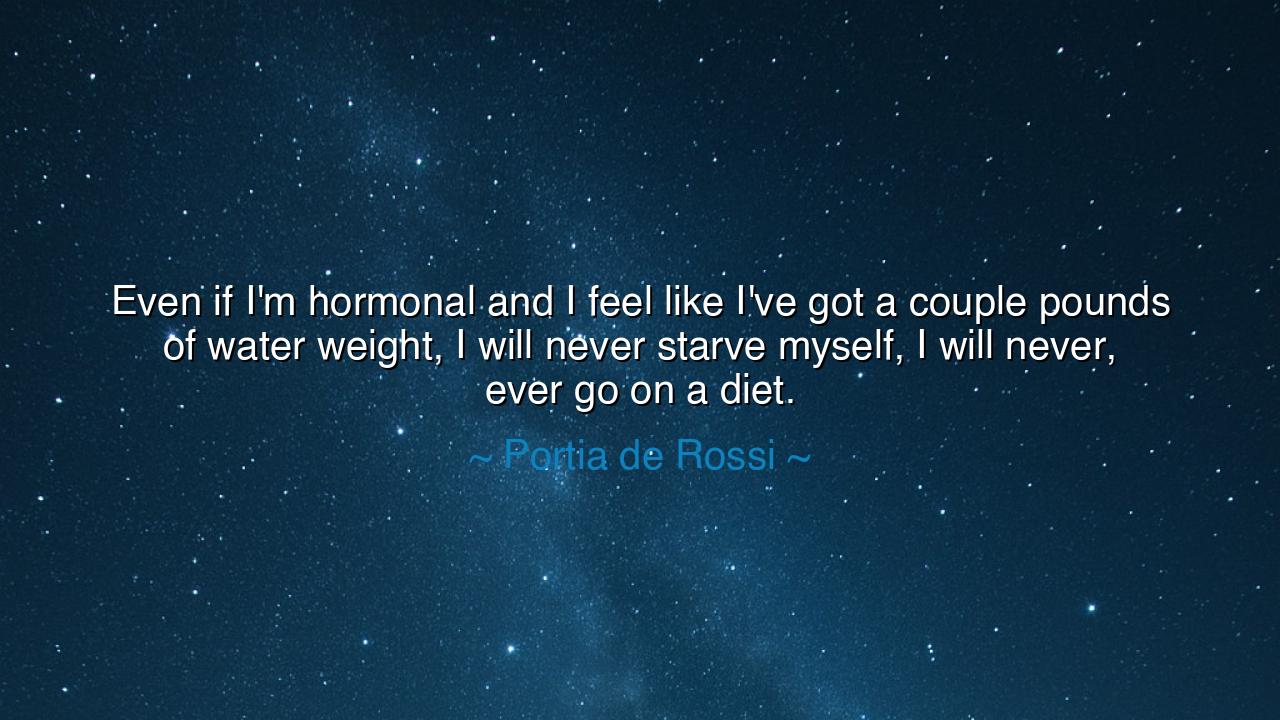
Even if I'm hormonal and I feel like I've got a couple pounds of
Even if I'm hormonal and I feel like I've got a couple pounds of water weight, I will never starve myself, I will never, ever go on a diet.






In the bold declaration of Portia de Rossi, there resounds a voice of defiance and liberation: “Even if I’m hormonal and I feel like I’ve got a couple pounds of water weight, I will never starve myself, I will never, ever go on a diet.” These words, though simple in form, carry the spirit of rebellion against centuries of silent suffering—the rebellion of a woman who has looked tyranny in the mirror and vowed never to bow again. Her vow is not against food, nor against discipline—it is against the bondage of self-denial, the cruel chains forged by shame, comparison, and the world’s demand for perfection.
To say “I will never starve myself” is not merely a statement of willpower—it is a declaration of freedom. For starvation, in this sense, is not only the hunger of the body, but the starvation of the spirit—the quiet erasure of one’s own worth for the sake of acceptance. De Rossi, who once struggled in the shadow of her own image, speaks now as one who has emerged into the light. In her words, we hear the echo of an ancient truth: that the greatest victory is not over others, but over the fear of oneself. She has chosen self-respect over punishment, nourishment over deprivation, peace over illusion.
Throughout history, the body—especially the body of woman—has been a battlefield of expectation. From the marble halls of ancient Greece, where statues of perfection cast impossible shadows, to the modern screens of glass and light that shape the gaze of millions, the struggle for bodily acceptance is as old as civilization itself. The poet Sappho, in her fragments, wrote not of perfection, but of beauty found in being alive, in love, in the ordinary grace of being human. And yet, in every age, society has demanded that women shrink themselves—physically, emotionally, spiritually—to fit its narrow ideals. De Rossi’s words stand as a sword against this ancient injustice. She declares that she will not shrink, that she will live whole, even when her reflection changes.
Her rebellion carries the same courage once shown by Hypatia of Alexandria, the philosopher who refused to be silenced by the prejudices of her time. Hypatia’s strength came not from conformity, but from truth—from the conviction that one must live according to reason and self-respect, even when the world disapproves. So too does de Rossi’s strength arise not from vanity, but from self-knowledge—the wisdom to say, “My worth does not depend on the shape of my body, but on the strength of my being.” In this, she joins the lineage of those who have fought, quietly or loudly, for the right to exist without apology.
When de Rossi speaks of refusing the diet, she speaks not against health, but against obsession. For the diet, in her metaphor, represents more than food—it symbolizes the endless cycle of guilt and denial that steals joy from the act of living. To diet forever is to live half-alive, to measure one’s days not by laughter or kindness, but by numbers and scales. The ancients called this hubris—the attempt to control what should be accepted. True harmony, they taught, comes not from domination, but from balance. To eat when hungry, to rest when weary, to honor the body as a temple of the soul—this is the path of wisdom.
Her statement also carries a lesson in compassion. To accept one’s own body, even in moments of imperfection, is to practice gentleness toward oneself—and, by extension, toward others. For how can one truly love the world if one cannot love the vessel through which one experiences it? The refusal to starve oneself becomes, therefore, an act of self-love, a form of quiet revolution. It is to say: “I will no longer participate in my own diminishment.” It is a return to wholeness, a remembering of the sacredness of being.
Let this, then, be the teaching passed down: Do not wage war against your own flesh. It is not the enemy—it is the earth upon which your spirit walks. When you feel unworthy, remember that no mirror can measure the light within you. Feed your body with respect, your mind with truth, and your heart with forgiveness. Reject the voices that tell you to shrink, for you were not born to disappear. You were born to take up space, to stand tall, to live with joy.
And so, in Portia de Rossi’s vow, there is not vanity but valor. It is the courage to live unashamed, to cherish oneself as a creation already complete. Her words remind us that strength is not in the denial of hunger, but in the acceptance of humanity. To honor one’s body, to nourish it in its changing tides, is the truest form of gratitude. Let those who come after us remember: the body is not a battlefield, but a home—and the soul that learns to dwell in it peacefully has already won the war.






AAdministratorAdministrator
Welcome, honored guests. Please leave a comment, we will respond soon